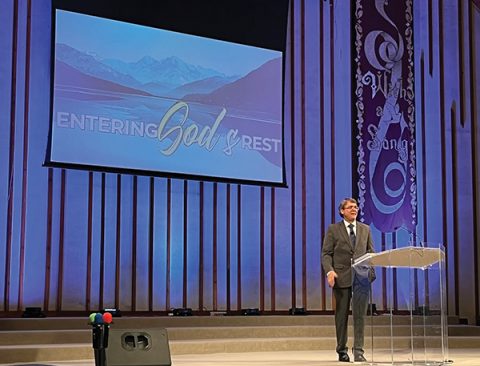Give to God and He Will Provide
Ted Baze, pastor of the Ceres Church, grew up in a home with parents who gave above and beyond their tithe. His father was a teacher at an Adventist school, which meant supporting the family with this income wasn’t always easy. But his parents prioritized giving tithe as well as giving 10 percent in offerings. This is in addition to his mother staying home with the children, and focusing on educating all of the children in Adventist schools.
Baze’s family was never rich, but they also never went hungry or lacked essentials. God always provided what was needed. This belief in giving was built into Baze’s life from childhood, and he has continued it into adulthood. He committed to giving at least 20 percent, in addition to his wife staying home to raise their children and being able to send the children to Adventist schools.
“Money is a big part of life,” says Baze. “And, in some ways, it's kind of a spiritual courage. It's giving us a way to interact with God. And it's a reminder of what He is supplying to us. It's amazing how when we give, we discover we still have more than we need. It's a reminder that when we give back to Him, it's part of that relationship.”
“For me it’s two aspects,” continues Baze. “It’s tithe, which I return to God and I let him use that 10 percent—it’s dedicated. But then there’s the joy of being able to say, What else can I do? What else does God need? And by the way, that's not limited to just an added 10 percent.”

When we see that we are able to give to God, it also shows us our ability to connect and impact the people around us, adds Baze. “When I'm willing to give to God, and I find out I have the resources to do that, it makes me realize I can also give to my family and to others, and it's more than just money. It's love. It's relationships. It's time. It gives me the courage to be willing to use these other currencies and be a blessing.”
Many times we hear profound stories about giving, but Baze says that the most important piece of his experience has been the long-term impact. He has seen his relationship with God and the people around him grow through his family’s trust in God. “For me, it has been more a matter of an ongoing experience than miracle stories,” he says.
Baze’s journey in giving hasn’t always been blessings, though. Not long ago, Baze was leaving a nominating committee at his church. All the other attendees had already left, and he was walking out to his car when he noticed the lights were on inside his car. Then he saw two people breaking into his car, attempting to steal it.
They pulled a gun on him, stole his wallet, phone, laptop, and car, then drove away. “I think I surprised them. They were trying to steal the car, but they saw me and decided to get a few bonuses,” he says. But while he stood on the sidewalk watching them drive away with his valuable possessions, he wasn’t thinking about the loss of money. Instead, he was relieved.
“I realized the car didn't mean anything to me. I didn't care if I ever saw that car again, and that helped me as far as materialism goes. It's been a journey of discovering how God can supply.” Baze says that on this journey he has been able to see that giving is not a blanket insurance policy. Instead it is a method of connecting with God and those around us in a deeper, more meaningful way. “God provided for my safety, and that was His most important gift,” adds Baze.
If you are considering giving more than 10 percent, or just beginning to give, Baze suggests that you test God. “I encourage you. Take the step. Go to Malachi and claim the promise of tithes and offerings, and watch what God does.”
“‘Bring the whole tithe into the storehouse, that there may be food in my house. Test me in this,’ says the Lord Almighty, ‘and see if I will not throw open the floodgates of heaven and pour out so much blessing that there will not be room enough to store it’” (Mal. 3:10 NIV).
By Brennan Hallock
Youth Evangelism Webinars

In the Youth Evangelism department of the Central California Conference, we firmly believe in the potential of young people to save young people. The Spirit of prophecy echoes this belief, encouraging us with the vision of a powerful army
of well-prepared young workers, hastening the proclamation of a crucified, resurrected, and soon-to-come Savior to the entire world (Education, 271).
The key is “well prepared” for this purpose, Dr. José Antonio Pagán, director of the department, and his wife Martita serve our powerful youth not only inspiring them in the identity of the Adventist youth ministry but also training them in each of the trainings that the church has. Adventist so that our young people fulfill this solemn mission before the return of Jesus.
One of these innovative methods is virtual education in the principles of youth evangelism. Every month, in addition to visiting churches presenting sermons
and supporting youth ministry, the department offers two virtual seminars in English and Spanish. These seminars, which typically one hour, are conducted in a virtual format and are led by experts who have the knowledge and experience in different training topics for our pastors, youth leaders, leaders of youth and adolescent ministry. To register for these seminars, please visit cccadventist. org Youth evangelism. Topics have been covered such as evangelism based on needs, how to evangelize teenagers, principles of preparing a week of youth evangelism and many topics of interest for each youth ministry to reach other young people.
We encourage you to participate in each of these seminars, which can be located under the youth evangelism window on the official conference website. If each of these tools continue to be used in favor of the advancement of the mission, we will see many young people involved in soul winning and their sense of belonging will grow by being part of the advancement of their local Churches.
The youth evangelism department is committed to ensuring that each young person in our territory at the Central California Conference is a missionary who, together with the power of the Spirit of God, can reach many of their friends for Jesus in their generation. Join the army
of young people who are preparing to proclaim the Second Return of Jesus, and be part of this inspiring mission.
By José Antonio Pagán
Kunde's Experience of Trusting in God’s Perfect Timing

Emma Kunde relates well with Esther’s story in the Bible, but for different reasons than many people relate to Esther. She sees Esther’s story more as an example of God working behind the scenes, but impacting us directly. Kunde is a member of the Mountain View Central Church, and sees her story of fighting cancer as an example of God working behind the scenes in powerful ways. She was diagnosed with cancer and underwent intensive surgery to remove a large tumor. Despite being a traumatic experience, she saw God working throughout this ordeal in similar ways to how God guided Esther in her story.
God’s name is never mentioned in the book of Esther, but we see God at work from the beginning to the end of the story. Kunde pointed out that there are three very distinct examples of God working in Esther’s story. One is when Queen Vashti refused to have King Xerxes show her off during a feast, resulting in her being thrown out of the palace and demoted from being queen. This could be seen as a terrible event, but it was also the beginning of God’s plan to save the Jews from Haman.
The next intervention was when Haman planned to hang Mordecai for not bowing to him. Haman was offended that Mordecai would not give him the respect he felt he deserved, and he believed murder would be an acceptable retaliation. Instead, Haman was asked by Xerxes to honor Mordecai by parading him through the streets, recognizing what Mordecai had done for the king by saving the king’s life.
When Queen Esther intruded on King Xerxes’ banquet it is another example of God intervening. Esther revealed the scheme that Haman had created to slaughter the Jews—and revealed that she was a Jew as well. Haman made the mistake of throwing himself at Esther while Xerxes was out of the room, begging for her sympathy, but he was walked in on by Xerxes. This resulted in Haman being executed on the very gallows he had built for Mordecai.
These examples show God working behind the scenes throughout Esther’s story, and Emma Kunde has seen similar interventions in her own life. “I experienced God’s intervention three times when I had cancer. Two years ago I was diagnosed with grade three sickle cell sarcoma cancer and went through a three-hour surgery to remove the five-inch tumor,” she explained.
Sickle cell sarcoma is a very deadly cancer of the skin, and often creates large tumors that are difficult to remove. The first doctor she visited misdiagnosed the tumor as benign, telling her it could be removed with local anesthesia. If she had gone through with this process, this would have instead made her cancer much worse.
“I know God was there to intervene because he caused my mom to not be comfortable with this doctor’s recommendation,” she explained. They found another doctor, who immediately ordered an MRI. The MRI showed that the tumor was cancerous, and God intervened again by allowing a Stanford oncological surgeon to be available to perform the surgery only two weeks out from her diagnosis.
Again God intervened during the surgery when miraculously a skin graft was not required. Skin grafting is a common practice for closing wounds left from the damage this type of cancer has left behind. This would have likely quadrupled her recovery time, but instead she was able to recover to where she was even walking within two months. For many, it takes almost a year to recover to the point where they can walk.
Kunde sees her experiences as God intervening in His own perfect timing. We do not always know the reasons God is intervening, or the right time for God to intervene. She explained that we simply need to trust God’s timing the same way Esther trusted God. “Even though our problems may seem hopeless, God will intervene for us in His perfect timing,” Kunde added.
“And we know that for those who love God all things work together for good, for those who are called according to his purpose,” Rom. 8:28.
By Brennan Hallock






